
The last in the triptych of blockbuster Black movies premiering this Black history month — the former being Malcom & Marie and Judas and the Black Messiah — is the biographical feature film The United States vs Billie Holiday.
The Billie Holiday biopic has been long in the works. Finally, the story of Billie Holiday and her persecution by the US government is streaming on Hulu.
Big names have all teamed up to carry the weight of the story, from director Lee Daniels of The Butler to a screenplay based on the book Chasing the Scream: The First and Last Days of the War on Drugs by Johann Hari adapted by award winning-playwright Suzan Lori-Parks. The film also stars Trevante Rhodes of Moonlight, Da’Vine Joy Randolph of High Fidelity, and Andra Day, Grammy award-winning singer-songwriter known for “Rise Up” as Holiday herself.
The United States vs. Billie Holiday – Trailer (Official) • A Hulu Originalwww.youtube.com
The film sees Holiday at the height of her career, battling the censorship from the government, racism in her life and around her, and a drug addiction. The United States vs Billie Holiday makes clear that Holiday’s smear campaigns, surveillance, and brief imprisonment were an effort to stop her from singing “Strange Fruit” — a carefully calculated operation by the Federal Bureau of Narcotics who feared Holiday’s song would incite protest and unrest.
The song “Strange Fruit,” known as one of the first and greatest commercial protest songs, is a haunting, unflinching condemnation of lynching and is now Holiday’s legacy; but most people don’t know its significance to Holiday nor the country.
In 1937 the Senate considered the first bill to outlaw lynching. Unsurprisingly, it did not pass. This is the sobering reminder with which we enter into The United States vs Billie Holiday, a chronicle, above all, about the unfairness of the criminal justice system and the persistence of racism in America.
“They’re killing negroes for less down south,” says a Black man to Holiday early in the film as she tries to get into a segregated elevator. These small moments are signposts for the larger issue of violent, systemic racism which permeates the film in both personal and political moments.
Stars like Ella Fitzgerald — and even Louis Armstrong and Charlie Parker who are mentioned as other subjects of surveillance — were already in precarious positions due to their race. But no one but Holiday would sing a song as openly provocative as “Strange Fruit,” despite the persecution that followed.
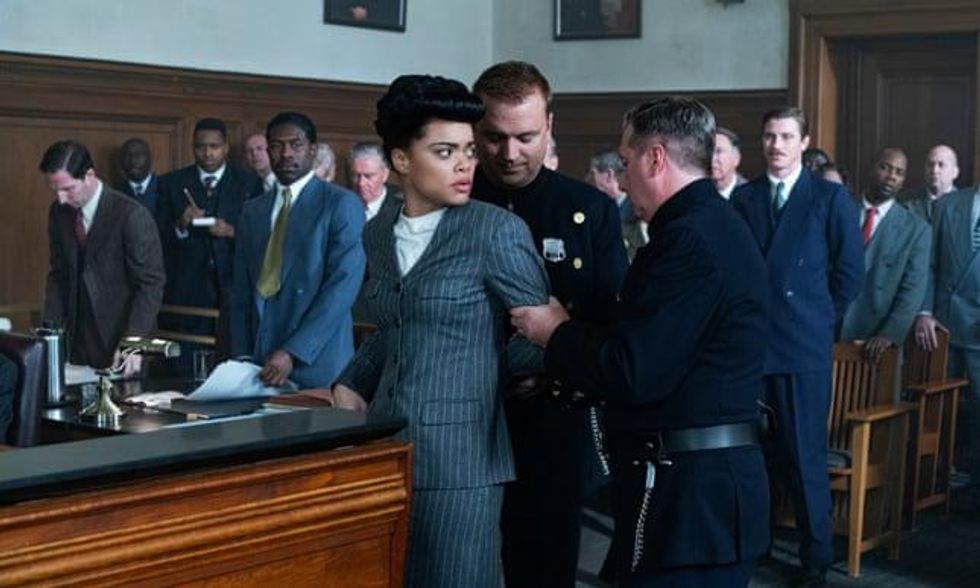
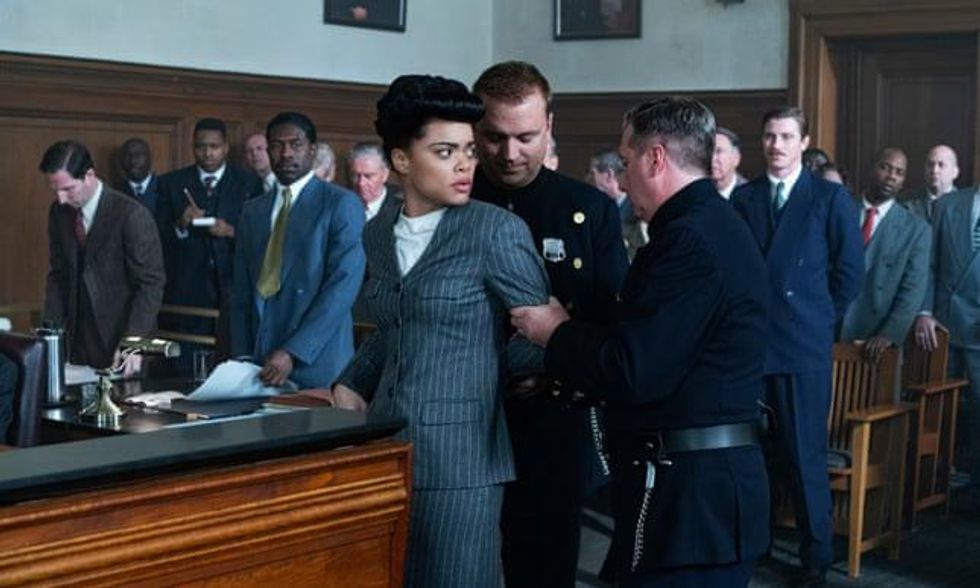
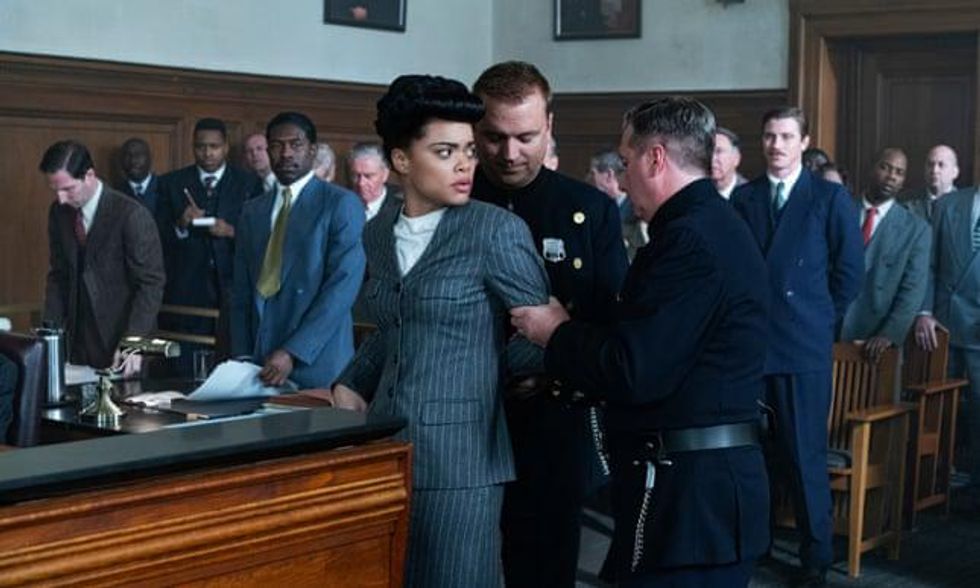
A New Trend in Hollywood
The violence of the system transcends Billie’s celebrity as her drug addiction becomes the scapegoat for the United States’s campaign against her politics. The film’s focus on the intense surveillance, framing, and infiltration into her personal life emphasizes the militancy of the FBI and pairs with the recent Hollywood trend of chronicling the historical targeting of Black political figures.
So far in 2021, both MLK/FBI and Judas and the Black Messiah have undertaken that project in different forms. The former is a documentary which reveals the horrifying extent of J Edgar Hoover’s wiretapping and surveillance against MLK; and the latter tells the story of Black Panther, Fred Hampton with a focus on William O’ Neal, the man who served as an informant for the FBI in the investigation leading to Hampton’s assassination.
All these projects find new momentum in the wake of the current social and political landscape. This recurring theme asks what it means to be an activist, what it means to negotiate the tensions between the self and the state, and the consequences of making either choice.
The more critical perspective of these films — films which interrogate power structures rather than just tell stories of Black trauma — is the product of increased Black representation behind the camera. While The United States vs Billie Holiday does not shy away from the sadness and the tragedy of Holiday’s story, its tone is empathetic rather than voyeuristic.
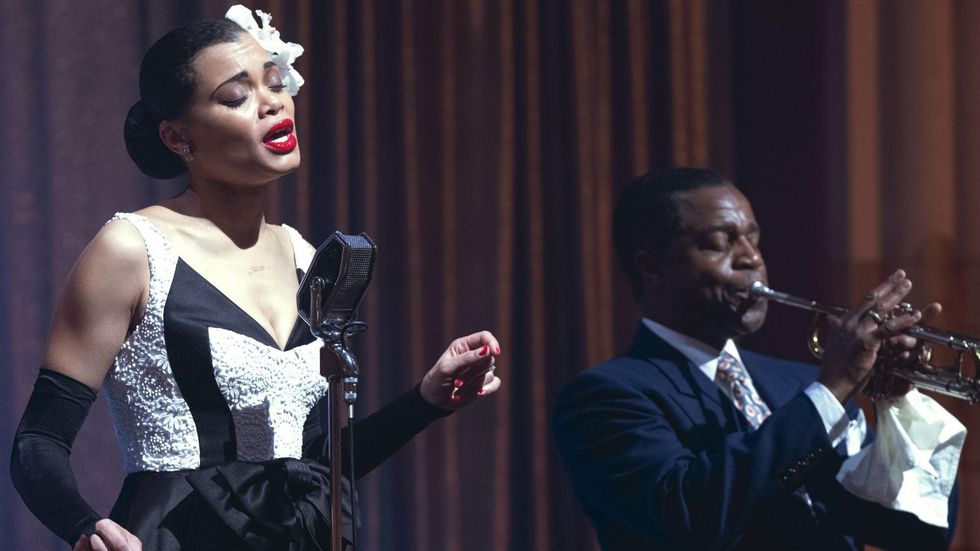
Andra Day’s Performance Anchors the Scattered Film
Structurally, the film loses its focus and struggles to find its center. Historical narratives often struggle with the tension between chronology and thematic cohesion, and The United States vs Billie Holiday gets lost in the play-by-play in parts, distracted by Holiday’s affairs and by the details at the expense of the bigger picture.
At moments, I wondered if the film wanted to be a series instead, like its writer Suzan Lori-Parks’s other upcoming project, Genius: Aretha. Its characters struggle under the time constraint — from the Black federal agent struggling with a moral crisis to the friends who want better for Holiday but still join her in her self-destructive escapades.
The song “Strange Fruit” too, mostly finds purchase because of its enduring legacy. As the film moves through its phases, “Strange Fruit” becomes peripheral rather than central, and some of the FBI scenes feel too contrived in their racism, almost cartoonish, to truly reveal the urgency, the stakes.
But despite all this, Andra Day’s performance anchors the film. In a stunning debut, Day plays Holiday with nuance and complexity that lets her be graceful, self-destructive, earnest, and coy. So it’s no wonder the film sometimes meanders through Holiday’s life — I, too, want to see Day do everything, interact with everyone — but the film is too capacious in scope to give each section enough care.
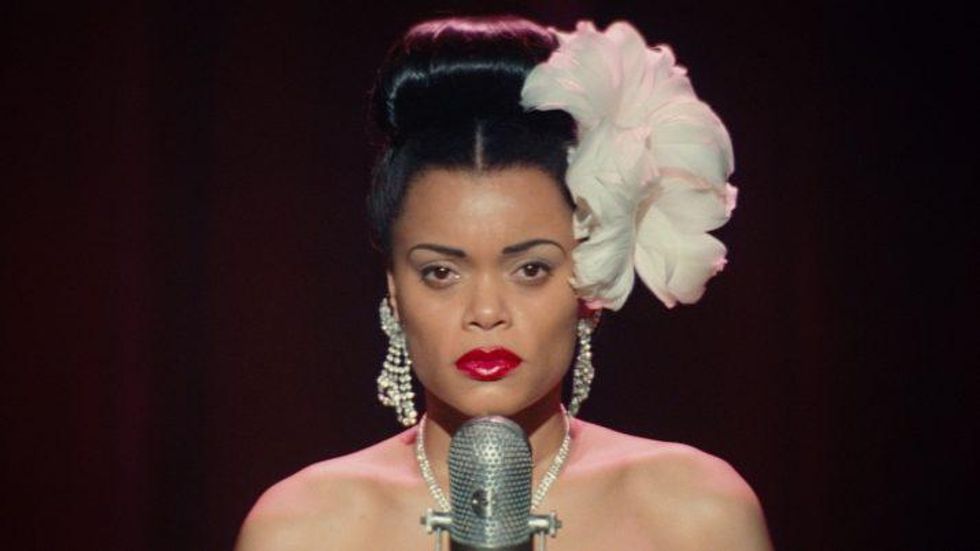
Billie Holiday and the Persecution of Black Women
What Andra Day excavates is the toll celebrity takes on vulnerable women, especially Black women at the time. The movie makes sure to emphasize that no other famous figures were as outwardly controversial in their politics as Billie Holiday.
To fight for what she believed in, to say something that mattered, Holiday opened herself up to attack, sabotage, and unimaginable pressure. “Of course I’m high,” she says after a performance, explaining why she felt she needed to do drugs right after her return from jail in a scene that echoes her earlier sentiment, “I need help, not jail.”
Yet, Holiday is denied the benefit of the doubt — unlike stars like Judy Garland, whom she mentions as a contemporary whose addiction landed her in a nice rehab facility, not a penitentiary. Instead, the media slams and vilifies Holiday, members of the FBI sit in the front row at her shows and physically remove her when she sings “Strange Fruit,” and they bribe the people close to her to plant evidence on her.
All the constant pressure takes its toll on Holiday, yet she still sings. Her commitment to the cause is admirable and reverberates through every note of the song. The film frames Holiday’s struggles as consequences of the pressure and politics surrounding her.
With the contemporary climate revealing so much about the misogyny of the media, The United States vs Billie Holiday strikes a prescient chord.Currently, conversations about the harmful harassment of the media, especially its effect on women given its patriarchal history and the unequal balance of power, revolve around Britney Spears; but they also echo the largely unsympathetic news coverage around Megan Thee Stallion’s shooting.
The film’s focus on race and lynching also grounds the violence and protests of 2020 in a history of Black pain and government negligence — except when it comes to persecuting organizers.
Overall, the story is sobering and stunning, even when it stumbles. It’s a gentle call to action, a reminder to do what you can with the gifts you have, and a mirror that points to a system that still persists.














